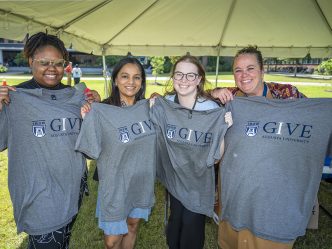Dr. Rebecca Harper’s life changed with one workshop.
“As cliché as it sounds, it changed everything about the way I teach writing,” she said. “It changed my life.”
And so Harper, a professor of education and literacy expert in the Augusta University College of Education, set to work bringing the same experience to Augusta University. This month, Augusta University was chosen to be the next site in the National Writing Project, one of the most extensive and effective teacher learning networks in the world – and the only one in the nation focused on writing and creative production.
“It’s a great honor to be a part of a national program of distinction. And the reason it has that caliber of recognition is that it cultivates teachers as leaders who can be agents of change in schools, through embracing the art and craft of writing,” said Dr. Molly Quinn, chair of the department of Advanced Studies & Innovation.
It also opens up new sources of funding to support the center’s efforts and other outreach in the community.
“This does give us opportunities for grants that we otherwise would not be allowed to explore,” said Dennis Dotterer, director of the Center for Innovation and Community Engagement in the College of Education. “This is an ongoing project that should grow over time.”
The CSRA National Writing Project Summer Institute will open its doors to area educators June 11-14 and June 18-21 at Augusta University to offer professional and personal development in the realm of writing and literacy. The heart of the program is the summer institute, an immersive writing experience where a community of writers explore issues in writing and in teaching writing. They will learn how to write, to improve their writing, how writers think, and how to better teach writing.
Harper, a prolific writer herself, said, “A lot of times, teachers think of writing as a static, linear process, and they don’t know what it’s like to be knee-deep in a draft and not know where you’re going with it.”
Submerging into the world of writing is one aspect of the summer institute. But it also allows educators to tackle topics that are interesting to them, or relevant to problems of practice. In other words, they can look at the things their students struggle with, and try to find solutions.
“We’ve done a pilot program before and the educators tackled a variety of topics – like children’s literature in the classroom and innovative ways to teach Shakespeare – for which they designed workshop demos that addresses that issue,” Harper said.
Workshopping an issue allows teachers to take their solutions back to their own schools and share them with colleagues, to present them at literacy conferences, and to circulate new techniques locally, regionally and nationally.
In addition, the Central Savannah River Area National Writing Project will maintain a catalog of solutions – from workshops to resource materials – so that when a partner school calls for help, Harper can match a summer institute graduate with their need. That allows the program to provide a continuous resource bank of applied principles from the summer institute.
The Summer Institute will run June 11-14 and 18-21 from 10 a.m. to 3 p.m. To apply, visit the CSRA National Writing Project application form. For more information on the institute or the CSRA National Writing Project Summer Institute, email Dr. Rebecca Harper.
 Augusta University
Augusta University




